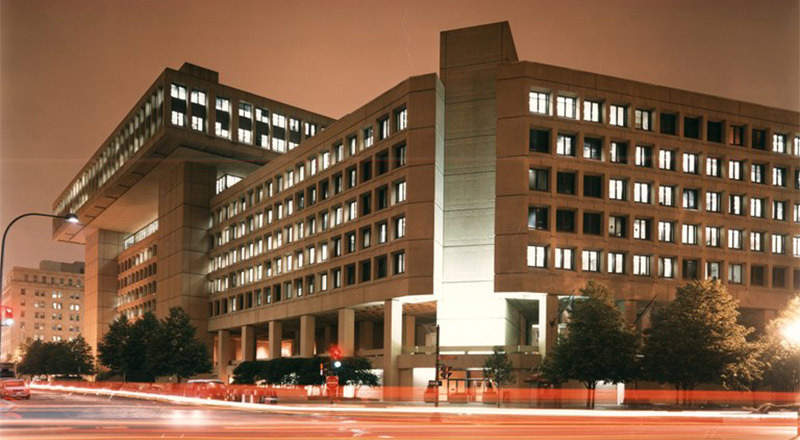FBI Director Christopher Wray on Sunday revealed strong smartphone encryption has prohibited his agency from gleaning data from more than half of the devices it attempted to access in the past 11 months, hindering progress in a wide range of ongoing investigations.
Speaking at the International Association of Chiefs of Police conference in Philadelphia, Wray said the FBI has been unable to pull data from more than 6,900 devices, the Associated Press reports.
"To put it mildly, this is a huge, huge problem," Wray said. "It impacts investigations across the board — narcotics, human trafficking, counterterrorism, counterintelligence, gangs, organized crime, child exploitation."
Wray's comments reignite an ongoing debate that speaks to the efficacy of encryption on consumer electronic devices like smartphones and tablets. Law enforcement agencies have long argued that strong encryption obstructs efforts to keep the public safe, as vital evidence might be locked away on protected devices. Tech companies, who effectively stand as gatekeepers to customer data, have countered, saying it is in the public's interest to keep that information secure.
Apple brought the encryption debate to the fore last year when it fought U.S. Justice Department requests for assistance in accessing an iPhone 5c used by San Bernardino shooter Syed Rizwan Farook. Apple declined the department's overtures, saying that the creation of a backdoor for one phone would undermine the security of millions of iOS devices worldwide.
At the time, CEO Tim Cook called the FBI demand "dangerous."
"But now the U.S. government has asked us for something we simply do not have, and something we consider too dangerous to create. They have asked us to build a backdoor to the iPhone," Cook said in an open letter to customers last year.
A court battle ensued, but proceedings were cut short when the government successfully unlocked Farook's iPhone with the help of an unidentified outside party.
As for the FBI's current encryption-related problems, Wray did not specify how many of the more than 6,900 devices were Apple products. He did, however, strike a more balanced tone over the encryption issue than did his predecessor, James Comey.
"I get it, there's a balance that needs to be struck between encryption and the importance of giving us the tools we need to keep the public safe," Wray said.
As noted by the AP, the Justice Department under President Donald Trump has suggested it will take a more aggressive stance on the topic of encryption. However, the government has yet to details what policy changes, if any, will be made toward securing consumer data from technology companies, and whether those regulations cover both cloud computing services and on-device encryption.
 Mikey Campbell
Mikey Campbell







-m.jpg)






 Christine McKee
Christine McKee
 Malcolm Owen
Malcolm Owen
 Marko Zivkovic
Marko Zivkovic

 Andrew Orr
Andrew Orr
 Andrew O'Hara
Andrew O'Hara
 William Gallagher
William Gallagher



-m.jpg)



30 Comments
What now? Do you ban toilet seats because they are also used by criminals?
Similarly, do you weaken and compromise all encryption technologies for ALL people because they can’t get into some people’s phones as easily as before ??
If the technology companies, airline carriers, banks and neighborhood watches are doing all the police work for the authorities, not sure why we still have them around on the payroll ?? If all they are going to do is show up on the scene for pictures after the fact, like in Vegas!
The feds need to work harder to get around encryption methods, they have that right, but they better not be suggesting that Apple needs to build in a backdoor option or a special firmware build that the feds can hold safely. I'm glad they seem to have more of a "cat and mouse" approach over a fascist one these days. Same goes for all the scared xenophobes on this forum that wanted exactly that after the FBI messed up their case. It wasn't long after that we heard that the solution Cellobrite created for that SB iPhone was leaked to the internet from a gov't computer. I knew it would happen, but I thought they'd keep it safe a little longer than that.
Then have congress outlaw encryption or stop whining about it. Apple and other smartphone manufacturers are doing everything within the legal course. Have congress bring it up and do it so we have another reason to boot them out of office.
When I see these types of articles it always makes me wonder how the FBI, et al, investigated criminals before smartphones. Are those techniques no longer useful because somebody uses and encrypted device to communicate with others? I understand that on-device encryption makes it harder for them to get information off of that phone, but where was similar information kept 20 years ago by those same people? In a filing cabinet with a lock? Did they only communicate over landlines that could be easily tapped? Or through he USPS? And now that we have encrypted smartphones all of that has now been neatly transferred over and is impossible to track?
Times change. Adapt and overcome.